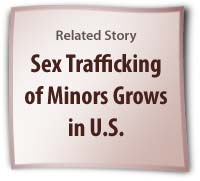“For you always have the poor with you, but you will not always have me” (Matt. 26:11, NRSV).*

ven the hardest heart would have to concede that while we shall always have poor people, some side effects of poverty are just too much to contemplate without falling to your knees and crying to God for deliverance.
For example, consider these words: “According to the U.S. intelligence community, of the estimated 800,000 people trafficked across international borders annually, 80 percent of victims are female, and up to 50 percent are minors. Hundreds of thousands of these women and children are used in prostitution each year. U.S. policy draws a direct connection between prostitution and human trafficking.”1
The math cited above suggests that 640,000 women and young girls are trapped in this horror each year, more than 1,700 every single day. Perhaps half of that number is composed of children and teenagers who are robbed of their
freedom, dignity, and most precious, the most intimate of human rights.
Ambassador Mark P. Lagon, an assistant United States Secretary of State, brought out these numbers and the tragic consequences of human trafficking in a recent speech in Washington, D.C., roughly 20 miles from the world headquarters of the Seventh-day Adventist Church. One anecdote he told is chilling, about a 15-year-old Lithuanian
girl he called “Ilka,” who was promised vacation work in England: “She was flown from Vilnius to London, accompanied by a Kosovar who had befriended her. As soon as she arrived, the Kosovar turned her over to a Macedonian living in England who raped and then sold her to an Albanian for [£]4,000. Ilka was enslaved in a series of brothels and resold seven times. Thankfully, she escaped and ran, half-dressed, to a police station in Sheffield. The first three traffickers were found guilty of trafficking for sexual exploitation, and sentenced to 18, 15, and 7 years.”2

The thought that this is happening should be enough to stir the conscience of all people of good will, but especially of Seventh-day Adventists. We were among the first in Protestantism to argue against slavery, as Douglas Morgan, a professor of history at Columbia Union College, has noted in his Web log.
3 We have stood against the evils of tobacco and alcohol. We believe in social justice.
We’re not silent on the issue of human trafficking. In Thailand the Adventist Development and Relief Agency has been combating this for a decade, ever since an area director noticed that girls in a rural village were not attending school, even though education is tuition-free.4 Annual costs for uniforms, books, and transportation can top US$400 per child annually, too much for poor peasant workers, earning as little as US$7.50 a month, to afford. The parents sell the children for a US$100 advance on wages; the girls go to brothels in the big cities.
Countries such as Albania, Moldova, Romania, Bulgaria, Russia, Belarus, and Ukraine are among those where trafficking proliferates, as well as parts of Africa and Asia, including Cambodia and Nepal.
There’s much we can do. Parents can, and must, educate their children that, as Ambassador Lagon says, “it is not OK to buy a body—buy a fellow human being—for 30 minutes.” We must be aware of potential human trafficking locations in our communities: brothels and sweatshops have been discovered in “nice” suburban areas and “gritty” downtowns alike.
We can support ADRA, www.adra.org, in their work, as well as Christian campaigns such as “Not For Sale,” organized by writer Diana Scimone (www.pawpawspals.org/not
forsale.php). The Salvation Army, whose work Ellen G. White commended, is also in the forefront of this effort.
We Adventists can also ask our elected representatives to intervene and act. We can educate others in our churches and our communities. We must pray, without ceasing. This scourge must end; to allow it to continue is inexcusable.
________
*Scripture quoted from The New Revised Standard Version (Anglicized Edition), copyright 1989, 1995 by the Division of Christian Education of the National Council of the Churches of Christ in the United States of America. Used by permission. All rights reserved._____________
1 “Fighting Demand for Sex Trafficking,” Mark P. Lagon, remarks at the Hudson Institute, Washington, D.C., February 5, 2008; accessed online at http://tinyurl.com/5pe6jr, March 6, 2008.
2 Ibid.
3“Ellen White, Slavery and Politics – I,” Douglas Morgan, Peace Messenger blog, accessed online at http://tinyurl.com/56a7aq, March 6, 2008.
4Details are found in “Thailand: ADRA Gives Girls a Safety Net Amid Human Trafficking Explosion,” by Taashi Rowe, Adventist News Network, Feb. 16, 2006; accessed online at http://tinyurl.com/5djv2q, March 6, 2008.
______________
Mark A. Kellner is news editor of the Adventist Review.

 The thought that this is happening should be enough to stir the conscience of all people of good will, but especially of Seventh-day Adventists. We were among the first in Protestantism to argue against slavery, as Douglas Morgan, a professor of history at Columbia Union College, has noted in his Web log.3 We have stood against the evils of tobacco and alcohol. We believe in social justice.
The thought that this is happening should be enough to stir the conscience of all people of good will, but especially of Seventh-day Adventists. We were among the first in Protestantism to argue against slavery, as Douglas Morgan, a professor of history at Columbia Union College, has noted in his Web log.3 We have stood against the evils of tobacco and alcohol. We believe in social justice.